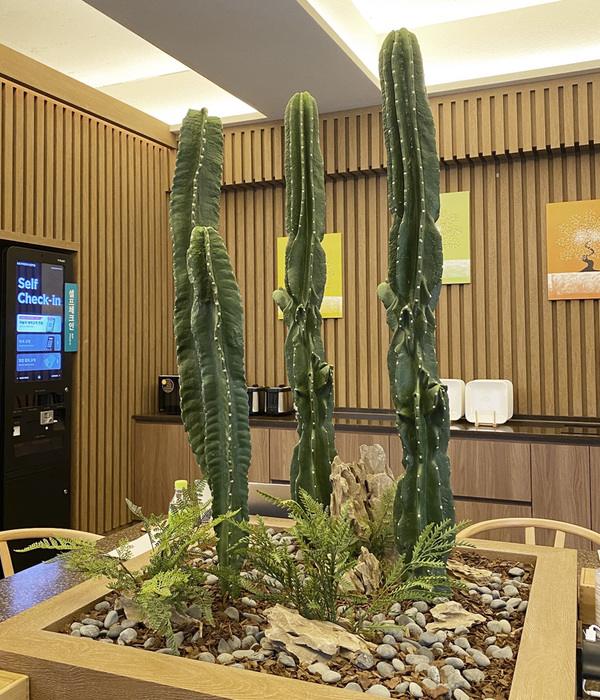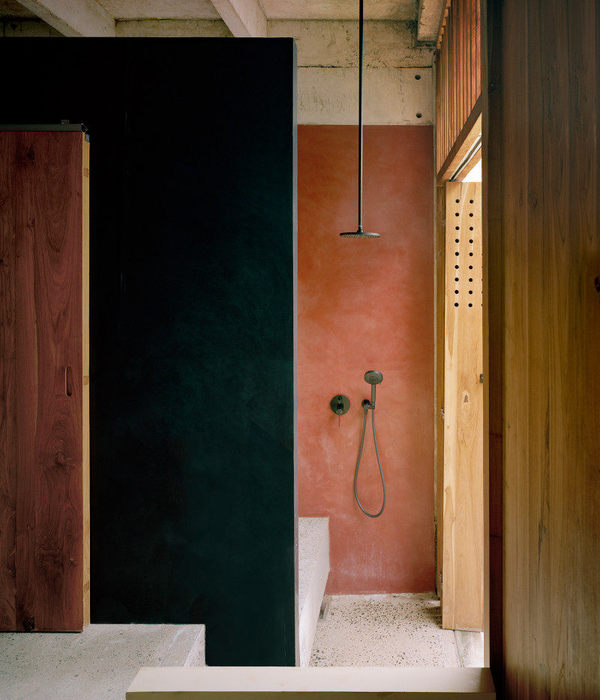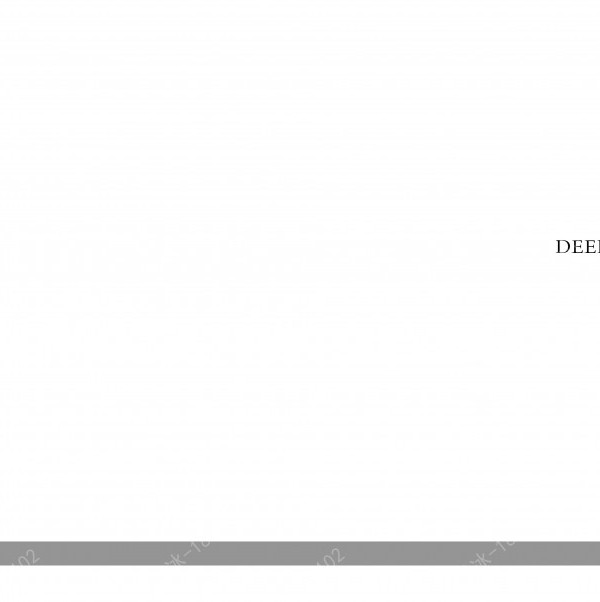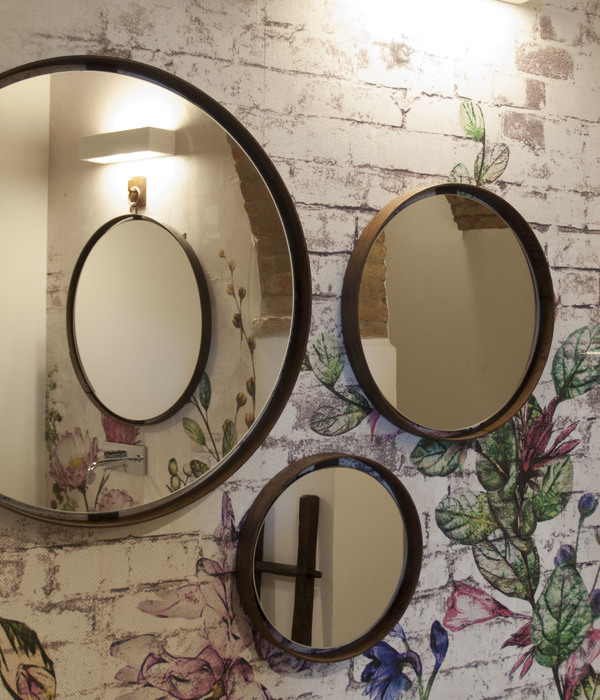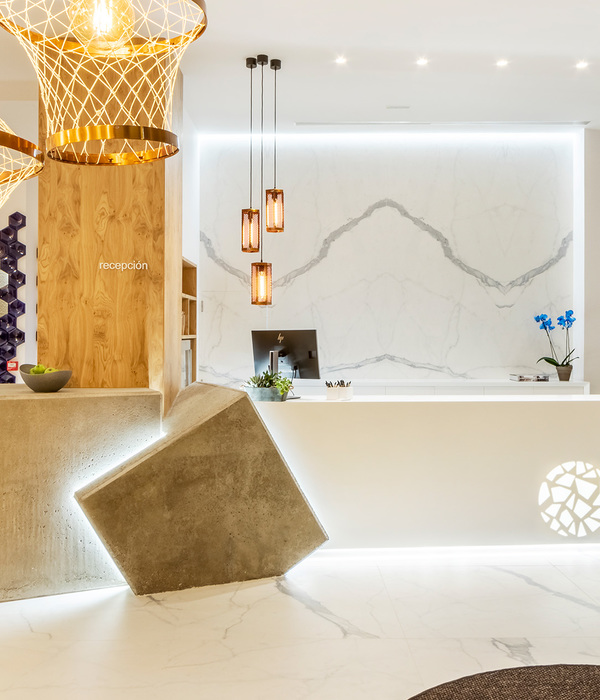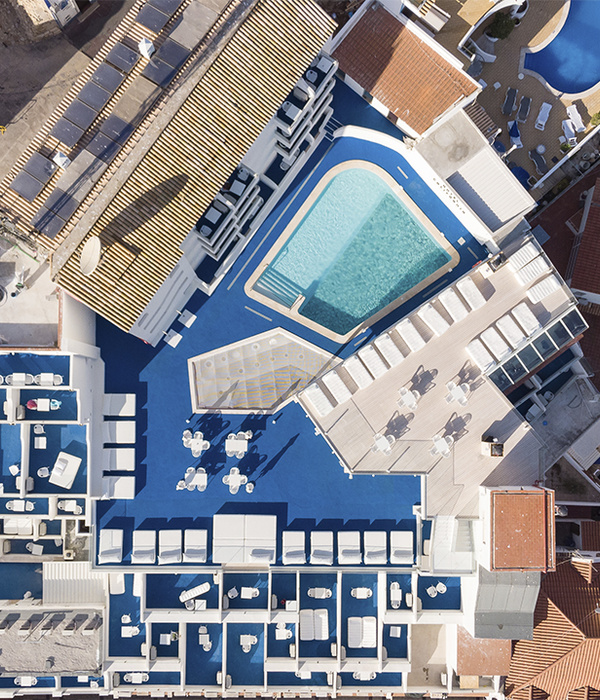该项目所处的环境,在我们的想象中或许已不存在。城市的压力、时间的流逝和由此产生的各种限制,往往会让某个原本独特的地方变得不再有趣,但这不会影响到它的本质和特征。
Cabedelo和它的海滩或许在过去更加为人所知,因其为人们提供了进行休闲活动的机会和多彩的滨海夜生活。我们相信,这处场地,包括沙丘、海岸、港口和大海本身,都将被赋予全新的生命,并带来一场能够激发全新生活方式、兴趣与平衡的对话。在改造自然的过程中保护和改善自然,这将促使人们以更加平衡的方式利用自然。
▼酒店外观,exterior view © Fernando Guerra | FS+SG
The location is one of those places that we imagine no longer exists. Urban pressures, the passage of time and the resulting constraints, that often transform a specific locale from an interesting to a less interesting locale, have not affected this site’s essential existence or character.
Cabedelo and its beach were perhaps better known in the past, due to the leisure activities on offer, the beach and local nightlife and entertainment. We’re sure that the location, the sand dunes, the beach, the port and the sea will now enjoy a new lease of life – a dialogue that will engender a new way of life, new interests, better balance, in a transformation of nature, protecting and promoting it and thereby fostering more balanced use thereof.
▼鸟瞰,aerial view © Fernando Guerra | FS+SG
设计方案是基于场地环境的独特性而提出的,其基本要素包括陆地、陆地的运动和沙丘的形成,正是它们将我们引向海滩、松树和绿地,随之产生的是建筑与城市的关系,以及建筑内部的理想空间。
曾有人这样说过:“最真实的概念,是已经存在于场地中的概念。”
▼一层平面图,1st floor plan © Carlos Castanheira
我们的目的是打造一间酒店。多年以来,乃至在今天,酒店这个词往往代表着一个包含许多房间的大型建筑,具有强烈的体积感和大量进出的人群。但我们所希望营造的是一个宁静的地点,它是为一小部分在此居住和逗留的人而准备的,他们将在不同设施与功能空间所营造的社交场景中碰面。
▼酒店露台和沙滩环境,the hotel terrace and the beach environment © Fernando Guerra | FS+SG
The proposal is drawn up specifically for the location and proposed in function of its unique characteristics. The underlying elements of the idea include the land, its movements, the formation of the sand dunes, that give rise to others and lead us to the beach, the pine trees and other vegetation, the urban relationship and the desired programme.
Someone once said and wrote that: the idea already exists in the location, which couldn’t be truer.
The objective is to create a hotel. The word, hotel, is not always connected to a positive intervention. For many years, and even today, the term is associated to a large building with many rooms, with a strong volumetric presence and hordes of people entering and leaving. It won’t be a hotel along the lines described above. It will be a place of tranquility, occupied by a few people who live or stay in the differentiated and different spaces, able to meet with another in the various social venues, in light of their facilities and functions.
▼餐厅,restaurant © Fernando Guerra | FS+SG
在到达酒店时,客人将直接来到主入口。车辆的入口被限制在满足基本功能时所需严格遵循的范围内;工作人员入口则位于南侧的道路。
Upon our arrival we encounter the main entrance. The entrance for cars will be restricted to that which is strictly necessary for the unit’s essential functioning. Otherwise the entrance to the hotel will be on foot – obligatory, easy and pleasant. The technical access will be achieved from the road to the south of the unit.
▼酒店大堂入口,lobby entrance © Fernando Guerra | FS+SG
▼电梯和楼梯间,elevator hall and staircase © Fernando Guerra | FS+SG
酒店主体的面积最大,包含了行政服务区域、餐厅、酒吧和大露台。利用地面与沙丘之间的高度差,我们创建了一个额外的半地下楼层,作为技术性的功能空间。社交和会议空间将依附在沙丘之上,使客人们能够一边眺望海景,一边享受夕阳和微风。
The main building, which has the largest volume, will house the technical and administrative services, a restaurant, bar and the large terrace. Taking advantage of the difference in height between the lower elevation of the ground and the higher elevation of the sand dune, a semi-subterranean floor will be created for technical functions. The social and meeting spaces for guests will rest upon the sand dune itself, making it possible to gaze out to sea, enjoy the sunset, and feel the wind.
▼休息室,lounge © Fernando Guerra | FS+SG
▼共享长桌,the shared table © Fernando Guerra | FS+SG
▼户外休闲区,exterior lounge © Fernando Guerra | FS+SG
▼露天平台,outdoor terrace © Fernando Guerra | FS+SG
这里没有真正意义上的酒店房间,有的只是一系列尺寸不同的小房子,它们彼此之间存在着细微的差异,并被谨慎地置入松树之间。再往南是一排小公寓,它们直立在沙丘上,同时也让沙丘变得更加稳固。
There will be no hotel rooms as such, something rather different is intended. Small houses of different sizes, almost identical but only similar, will be assembled – carefully distributed between the pine trees, where there is sufficient space for them to be inserted. Further south, there will be a line of small apartments, erected on the sand dune itself, thereby solidifying and preserving it.
▼一系列小房子被谨慎地置入松树之间,a set of mall houses are carefully distributed between the pine trees © Fernando Guerra | FS+SG
再往后一些,阳光普照的地方,这里建造了一个更大的体量,与沙丘和沙丘上的其他建筑形成了和谐的关系。这个体量包含了游泳池和类似于SPA的设施。
In the centre, further back, but with good sun exposure, there will be a larger volume, integrated within the volumes of the other constructions and the sand dune – that will house a swimming pool and a facility today known as a SPA.
▼从小屋望向酒店主体,view towards the main building from the bungalows © Fernando Guerra | FS+SG
▼从酒店中庭望向小屋 © Fernando Guerra | FS+SG view towards the bungalows from the hotel atrium
建筑使用的自然材料均可在当地找到并组装,从而能够适应土地形态和既有的地理特征,就像是预先计划好的一样。木材和玻璃作为主要材料,在提供舒适性和隐私性的同时,也能够将一部分自然环境引入室内空间。
The materials to be used are already found in the locale – i.e. natural materials. Wooden constructions, assembled in the locale, adapted to the lie of the land, existing features, as if pre-planned. The materials to be used will be primarily wood, some glass, enabling the interior to extend into the exterior, and ensuring that the exteriors form an integral part of the interiors, offering comfort and privacy.
▼客房,guest room © Fernando Guerra | FS+SG
▼客房露台,guest room terrace © Fernando Guerra | FS+SG
铜板屋顶覆层确保了防水性,并将随着时间的推移呈现出接近于周围自然环境的色彩和光泽。余下的“材料”由现成的大片绿植构成,它们将被完整地保留在场地当中。
The copper-sheet roof coverings guarantee waterproofing and above all will generate a natural colouring, that over time will draw closer to the existing natural colours. Other key materials are the existing expanses of green, all of which are to be maintained.
▼沙丘之上,lying on the sand dunes © Fernando Guerra | FS+SG
▼项目模型,project model © Carlos Castanheira
▼酒店主体模型局部,main building model partial view © Carlos Castanheira
▼一层平面图,1st floor plan © Carlos Castanheira
▼二层平面图,2nd floor plan © Carlos Castanheira
▼屋顶平面图,roof plan © Carlos Castanheira
▼酒店主体立面图,hotel main building elevations © Carlos Castanheira
▼酒店主体剖面图,hotel main building sections © Carlos Castanheira
▼小屋A平面和剖面图,Bungalow A plans and sections © Carlos Castanheira
▼小屋B平面和剖面图,Bungalow B plans and sections © Carlos Castanheira
Dublin, May 28, 2008 Carlos Castanheira, architect
Hotel Feelviana Praia do Cabedelo, Viana do Castelo, Portugal 2014-2017 Arquiteto/Architect: Carlos Castanheira Escritório/Office: CC&CB -Architects, Lda Coordenador do Projecto/Project Coordinator: Orlando Sousa, Colaboradores/Collaborators: Joana Soeiro Fernanda Sá Sofia Conceição Diogo Pinho Susana Oliveira Sara Pinto Mariana Mendes Erika Musci Germano Viera Pedro Afonso Engenharias/Engineering: Sprenplan Construtora/Construction company: Vodul Construção em Madeira/Wood construction: PORTILAME Área de Construção/Total Building Area 3.000m2 Fotografia/Photography: Fernando Guerra -FS+SG – Fotografia de Arquitectura
{{item.text_origin}}

